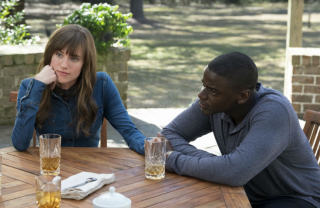 By Vincent Abbatecola
By Vincent Abbatecola
From 2012 to 2015, Jordan Peele and Keegan-Michael Key brought television audiences their sketch-comedy show, “Key and Peele,” which focused on several social topics, such as race relations and ethnic stereotypes. Like all talented comics who deal with such subjects, this duo was able to do so in a way that made you laugh and think about their overall messages.
This is what has led to the first big surprise of 2017 cinema, in which Peele takes his skill for comical social commentary and uses it for his directorial debut with the horror-comedy film, “Get Out.” In a movie that’s creepy, darkly funny, satirical, and hugely enjoyable, this is an example of the talent and possibilities that can still come out of mainstream horror films.
 Chris Washington (Daniel Kaluuya) and Rose Armitage (Allison Williams) have been dating for some time, and she soon decides it’s time to introduce Chris to her parents. While he’s hesitant to do so because of Rose not telling her parents he’s African-American, Chris goes along with her to her parents’ home for a weekend getaway. Upon meeting him at first, Rose’s parents (Catherine Keener and Bradley Whitford) and brother (Caleb Landry Jones) are welcoming, if a little off. When the family throws a party with a bunch of their friends who take a strange interest in Chris, he begins to feel more uncomfortable and out of place, leading him to believe there’s something strange lurking beneath the facade of pleasant faces.
Chris Washington (Daniel Kaluuya) and Rose Armitage (Allison Williams) have been dating for some time, and she soon decides it’s time to introduce Chris to her parents. While he’s hesitant to do so because of Rose not telling her parents he’s African-American, Chris goes along with her to her parents’ home for a weekend getaway. Upon meeting him at first, Rose’s parents (Catherine Keener and Bradley Whitford) and brother (Caleb Landry Jones) are welcoming, if a little off. When the family throws a party with a bunch of their friends who take a strange interest in Chris, he begins to feel more uncomfortable and out of place, leading him to believe there’s something strange lurking beneath the facade of pleasant faces.
Daniel Kaluuya’s performance encapsulates the feeling of discomfort and isolation you feel when faced with a crowd of others who see you as different. Through his interactions with Rose’s family and their friends, we see Chris try to make the best of an odd situation as he becomes increasingly suspicious of the happenings around him. We are also provided a bit of an emotional backstory to his character where Kaluuya is given a chance to display Chris’ vulnerable side in a pivotal scene early on in the film between him and Rose’s mother.
One of the best surprises of the film is how Catherine Keener, despite being the most recognizable name in the cast, doesn’t try to make herself the biggest presence in the film. Instead, she provides a fairly understated performance that’s all the more creepy because of that approach to the character. She displays a persona that’s calm on the surface, yet menacing underneath, and with that, Keener puts you on edge whenever she’s on screen.
Other memorable performances from the supporting cast include Caleb Landry Jones as the threatening brother with violence boiling inside; Betty Gabriel and Marcus Henderson as the unsettlingly pleasant maid and groundskeeper for the Armitage family; and Lil Rey Howery as Chris’ friend who offers most of the film’s comic relief.
The screenplay by Peele uses the concept of Stanley Kramer’s classic 1967 film “Guess Who’s Coming to Dinner” and the “Black Guy at a Party” stand-up skit from “Key and Peele” and twists them into something that’s both sinister and uncomfortably funny. With his narrative, he carefully doles out the frights and surprises and doesn’t let the need to scare us get in the way of fleshing out the satire of the story. He takes his time in setting up the premise and letting us get to know the family, so then by the time everything is revealed, we’re even more creeped out because we have many details concerning the family and the harm they’re capable of doing. Although the disclosure of the family’s motivations veer into territory that’s a bit absurd, it still works in such a way that adds another layer to Peele’s satirical views.
Peele proves to be a talent to watch behind the camera. As a director, he’s able to give us scares and laughs, all while making us contemplate the film’s issues involving race relations that are still prevalent today, and with his cast, he mines every bit of awkwardness that comes out of the situations in which he places his main protagonist. He also makes a very effective use of close-ups in some of Chris’ interactions with the film’s mysterious characters, placing us in even more discomfort that gives us a claustrophobic feel of Chris’ space being invaded by those who have nefarious plans for him.
It’s a pleasure to watch filmmaking talent come from a new director, and with “Get Out,” Peele has already made himself into one of the biggest breakouts of the year. Mainstream horror deserves more visions like his, as he’s another filmmaker who has shown that the genre can give you an experience that’s not only frightening, but reflective.
Final Grade: A-

You must be logged in to post a comment Login